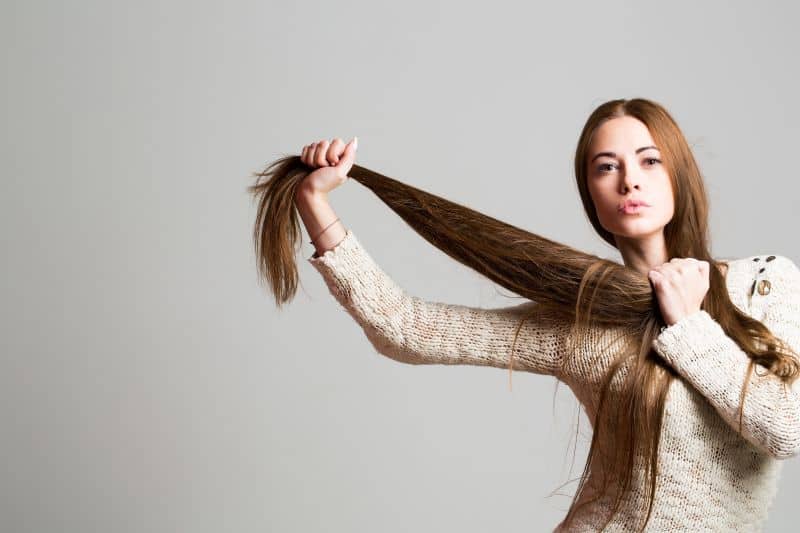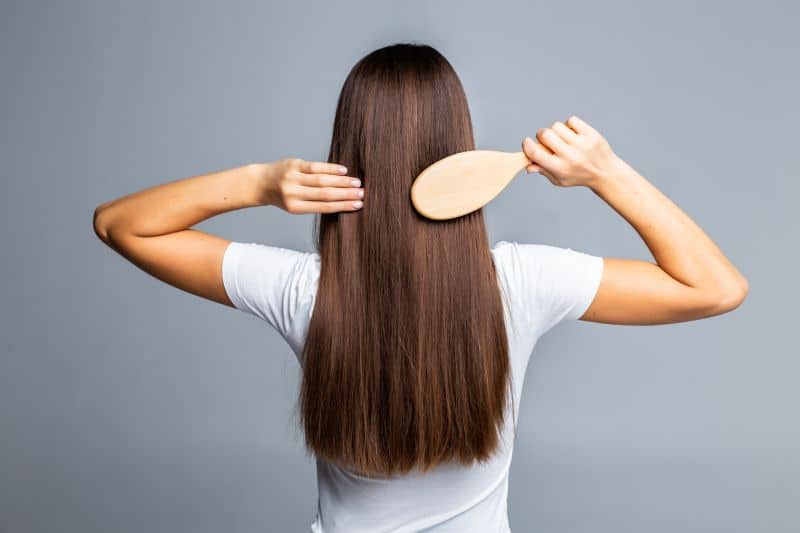Last Updated on December 31, 2022 by Gaga
Excessive heat styling and frequent chemical treatments can reduce hair strength and vitality, making it susceptible to breakage. Although excessive hair breakage can be frustrating, the good news is that the problem can be managed by having the right products in your bathroom cabinet.
The right combination of protein- and moisture-based hair products can help maintain optimal moisture and protein balance in hair fibers, making them healthier, and more resilient to breakage.
One of the most efficient ways to protect your hair from breakage is to select the optimal frequency of hair washing.
Frequent shampooing can remove the protective sebum coating that rests on the hair shaft; this can cause damage to the cuticle layer. A lack of natural oils results in dryness, increased friction, and brittle hair strands. To prevent excessive dryness, individuals with dry, damaged, or curly hair should limit shampooing up to twice a week.

1. Pre-Shampoo Treatments
These protective treatments prepare your hair for washing to minimize the drying effect of shampoos and repair hair before washing. Pre-wash treatments lock in moisture, help with detangling, and increase tensile strength to dramatically reduce hair breakage.
Related products: Creators of Living Proof Timeless Pre-Shampoo Treatment claim that their product will reduce breakage by 85% after one use. Other brands of pre-shampoo treatments advertised to boost hair elasticity include Philip Kingsley Elasticizer Pre-Shampoo Treatment, Huile de Leonor Greyl Pre-Shampoo Oil Treatment, and Kerastase Resistance Soin Premier Therapist Pre-Shampoo Treatment.
2. Shampoos for Brittle Hair
Sulfate-based shampoos have great lathering capabilities, and they are very efficient at removing greasy residue from the hair and scalp. However, harsh sulfate detergents in hair shampoos can strip the hair of its natural oils and increase friction between hair fibers, leaving your locks prone to tangling and breakage.
People with dry, damaged, or chemically-processed hair should use shampoos with mild cleansing agents. Mild cleansers are plant-derived, less likely to cause excessive dryness, and are safer for the environment.
Ingredient-focused selections of hair shampoos and conditioners will provide you with better results than shopping for top brands. You might want to look for humectants and other moisturizing ingredients, as well as hydrolyzed proteins.
The latest innovations are bond-building hair shampoos and the inclusion of ceramides and bamboo extract in anti-breakage shampoo formulas.
3. Hair Products with Ceramides
Ceramides are a group of lipids naturally found in human hair. Ceramides act as a binder, keeping hair cuticles together, which results in smooth and shiny hair. Ceramides are also moisture-supporting ingredients that encourage moisture absorption and retention in the hair shaft.
Too frequent shampooing, chemical treatments, and hot styling can deplete supplies of ceramide over time. Lack of ceramides results in rough cuticles, which allow moisture to escape, leaving hair dry, inelastic, and susceptible to breakage.
Ceramides are most beneficial for women with color-treated and/or relaxed hair. Products infused with ceramides can restore damaged cuticles and improve hair elasticity, making the strands less prone to breakage.
Shampoo brands with ceramides: L’Oreal Paris Elvive Total Repair 5 Repairing Shampoo and Conditioner and M72 Ceramide Keratin Shampoo & Conditioner.

4. Hydrolyzed Proteins for Breakage Prone Hair
Chemical treatments, excessive heat, and daily grooming can damage the protective cuticle layer, leading to the chemical degradation of hair proteins. Loss of keratin results in reduced strength and elasticity of hair fibers.
Proteins in hair care products are large particles that cannot penetrate the hair shaft and act on the surface layer, forming a moisture-retentive film, increasing hair volume and shine.
Newer lines of protein-rich hair products contain hydrolyzed proteins. Hydrolysis is a chemical process in which the protein compound is broken down into smaller chains of amino acids. When incorporated into hair products, low- molecular-weight amino acids are easily absorbed into the hair, improving its elasticity and luster.
Hydrolyzed keratin has been used for decades to repair damage and give strength and flexibility to hair. To meet increasing customer demand for an alternative to animal-derived proteins, cosmetic chemists developed Phyto-proteins, such as hydrolyzed wheat protein, hydrolyzed soy, and hydrolyzed corn protein.
Hydrolyzed proteins penetrate the hair shaft and temporarily rebuild damaged spots, reviving the structure of hair strands. Adding hydrolyzed protein to hair products helps increase hair elasticity and reduces the risk of breakage.
5. Hair Products with Bamboo Extract
Bamboo is the richest source of organic silica. Bamboo extract contains 70% silica. Silica is an important component of collagen, and it plays a key role in improving the elasticity of skin and hair. When the level of silica is decreased, hair becomes brittle and more prone to breakage.
Silica-based hair products help strengthen hair fibers and stimulate healthier hair growth. Shampoos enriched with bamboo extract help seal the cuticle, tame frizz, and add a beautiful shine.
Sulfate-free hair-strengthening products that contain bamboo extract include Alterna Bamboo Shine Luminous Shine Shampoo & Conditioner and Boo Bamboo Strengthening Shampoo.
6. Conditioners for Brittle Hair
Regular conditioning after every shampoo is an important part of the hair care routine for those who suffer from hair breakage. Rinse-out conditioners form a thin coating over the hair shaft, protecting the strands from further damage and reducing the risk of breakage.
Trying to untangle wet hair without the use of a conditioner will cause split ends and breakage. Conditioners flatten the cuticle scales, which decreases inter-fiber friction and makes hair feel soft to the touch. The protective coating they leave on the hair helps separate hair strands and makes detangling and combing easier.
7. Deep Conditioners
Deep conditioners are more effective at repairing hair damage because they contain more concentrated ingredients and stay longer on the hair than rinse-out conditioners. They usually remain on the hair for at least 15 minutes before rinsing. Deep conditioners are formulated as thick creams enriched with proteins and other ingredients that promote moisture retention and help rebuild inner hair strength. Adding heat to your intensive conditioning treatments allows for deeper penetration of conditioning agents into the hair shaft.
Protein and moisture work together to keep hair healthy and resilient to breakage. Over-conditioning that is not balanced with protein can cause protein deficiency leading to unmanageable hair that is prone to breakage.
Preference for protein-rich hair products can cause a deficiency of the moisture needed to lubricate the hair, leaving the strands inelastic and brittle.
Related products:
- Deep conditioner with ceramides: Matrix Biolage Fiber Strong Cream.
- Deep conditioner with bamboo extract: Tree Naturals Bamboo and Fig & Lotus Flower Deep Conditioner.
8. Hair Straightening Leave-in Conditioners
Leave-in conditioners are used on damp hair to seal in moisture, smooth the cuticles, control the frizz and help with detangling. Repair leave-in conditioners help repair damage and keep hair healthy and strong.
Related product: L’Oreal Professional Expert Serie Sealing Repair Lipidium Double Serum uses Phytol-Keratin and Ceramides to reinforce inter-cellular cement that fills the damaged area of hair and boosts internal strength to minimize breakage.

Gaga is a blogger and founder of the Softer Hair website. She often says that insomnia is to blame for her first blogging attempts. Being the night owl, she hated the morning alarm. She left her office job and returned to what she loved most - writing.

